
Il 21 febbraio 1431 nella cappella del castello di Rouen di fronte al presidente del tribunale Pierre Cauchon, assistito da un elevato numero di assessori, i quali sono soprattutto figure religiose, siede la nota Pulzella d’Orléans: Giovanna d’Arco. L’abito virile che era solita indossare durante la sua missione, la volontà di non sottomettersi a nessuna autorità e la fierezza con cui affermava di sentire le Voci di Santa Caterina o dell’Arcangelo Michele costituiscono le ragioni fondamentali di cui i giudici si servirono per condannarla eretica.
Pierre Cauchon nell’ordinanza di apertura del processo scrive che in molti luoghi si era diffusa la voce di quella donna dimenticata della dignità conveniente al suo sesso, che per una singolare e mostruosa depravazione indossava abiti adatti agli uomini e che sosteneva affermazioni contrarie alla fede cattolica. Scrive inoltre che quando questi fatti vennero a conoscenza dei padri dell’Università e del frate Billorin, vicario dell’Inquisitore del regno di Francia, quest’ultimi pregarono i Duca di Borgogna di consegnare a loro la Pulzella come sospetta di eresia.
Con questa accusa il 21 febbraio 1431 ha inizio il processo di condanna di Giovanna d’Arco.
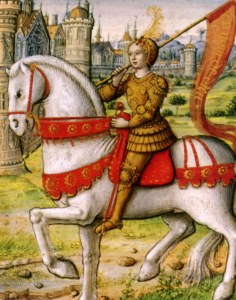 Già durante la prima sentenza pubblica si nota il forte carattere della Pulzella, che è la fonte della forza con la quale muoveva la spada per difendere la propria nazione. Prova di questo coraggio e determinazione è la risposta che dà a Cauchon dopo che le viene proibito di lasciare la prigione, dice infatti: “Non accetto nessuna proibizione. Se io scappassi nessuno potrebbe accusarmi di aver tradito la parola data, non vi prometto proprio nulla” Giustifica poi la sua risposta dicendo: “I prigionieri hanno ben diritto di scappare:”.
Già durante la prima sentenza pubblica si nota il forte carattere della Pulzella, che è la fonte della forza con la quale muoveva la spada per difendere la propria nazione. Prova di questo coraggio e determinazione è la risposta che dà a Cauchon dopo che le viene proibito di lasciare la prigione, dice infatti: “Non accetto nessuna proibizione. Se io scappassi nessuno potrebbe accusarmi di aver tradito la parola data, non vi prometto proprio nulla” Giustifica poi la sua risposta dicendo: “I prigionieri hanno ben diritto di scappare:”.
Alla prima sentenza segue la seconda in cui Giovanna descrive accuratamente alla corte presidenziale il suo rapporto con le Voci, fattore per cui viene condannata eretica.
GIOVANNA:“All’epoca dei miei tredici anni sentii una voce mandatami da Dio per guidare le mie azioni. La prima volta ho avuto molta paura. La voce si fece sentire a mezzogiorno, eravamo d’estate. Nel giardino di mio padre. Sapete, non ero a digiuno e non avevo digiunato la sera prima. Ho sentito una Voce, che veniva da destra, dal lato della chiesa. Quasi sempre c’è anche un bagliore. La luce viene sempre dallo stesso lato della Voce e di solito è molto forte. Pensavo che fosse giusto che ascoltassi la Voce. Credo che mi fosse mandata da Dio. Dopo averla ascoltata tre volte capii che era la voce di un Angelo. La Voce mi ha sempre consigliato bene e io l’ho sempre capita.
BEAUPERE (assessore): ”Quale buon consiglio ti dava la Voce per la salvezza della tua anima?”
GIOVANNA: “Mi diceva di comportarmi bene, di andare in chiesa. Mi disse che era necessario che io, Giovanna, venissi in Francia. … La voce mi diceva di liberare Orléans assediata. Mi diceva di andare a trovare Robert di Baudricourt a Vaucouleurs perché mi desse degli uomini per accompagnarmi.”
…
GIOVANNA:” Non passa giorno senza che io senta le Voci.”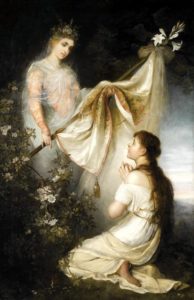
GIUDICE:” Le vedi sempre con lo stesso vestito?”
GIOVANNA:” Le vedo sempre nello stesso modo. Hanno il capo cinto da ricche corone.”
GIUDICE:” Come fai a riconoscere che quella cosa che ti appare sia uomo o donna?”
GIOVANNA:” Le riconosco dalle Voci e dalle rivelazioni che mi fanno”
GIUDICE:” Che specie di figura ti appare?”
GIOVANNA:” Il viso”
GIUDICE:” I capelli sono lunghi fino alle spalle?”
GIOVANNA:” Non ne so proprio niente. Non so se ci sono anche braccia o altre membra. Parlano molto bene con gentilezza e io le capisco, benissimo.”
Le Voci sono il soggetto principale anche dei 2 interrogatori successivi in cui Giovanna sostiene che sono loro a indicarle cosa rispondere alle domande che le vengono poste, e sono loro a darle conforto. Come appunto dice:” molto conforto mi è venuto anche da San Michele, fu lui il primo a mostrarsi ai miei occhi.” E furono le Voci ad averle suggerito che avrebbe trovato la sua spada nella chiesa di Sainte Catherine di Fierbois, e ad assicurarle che l’assedio di Orléans si sarebbe concluso con la vittoria francese. Le Voci costituiscono per Giovanna la ragione di tutte le sua azioni, spesso infatti durante il processo ripete la frase ”tutto quello che ho fatto l’ho fatto per volontà di Dio.”
Nell’ultima udienza pubblica avvenuta sabato 3 marzo il giudice inizialmente approfondisce le ragioni per cui Giovanna indossa abiti maschili.
GIUDICE:” Non ti hanno mai fatto domande su codesto abbigliamento?”
GIOVANNA:” Si, mi chiesero dove e quando avessi incominciato a portare abiti maschili; io risposi che era stato a Vaucouleurs.”
GIUDICE:” Al castello di Beaurevoir non ti hanno fatto domande su questo abbigliamento?”
GIOVANNA:” Sì sì. E io risposi che non avrei cambiato abito senza permesso di Dio. Madamigella di Lussemburgo e la signora di Beaurevoir mi avevano offerto un vestito da donna oppure della stoffa per farmene uno e mi chiesero di indossarlo ma io dissi che non avevo ricevuto l’autorizzazione da Nostro Signore.”
GIUDICE:” Credevi di commettere peccato mortale indossando abiti femminili?”
GIOVANNA:” Credo che faccio meglio cercando di ubbidire e di servire il mio Signore?”
Infine l’ultima delle udienze pubbliche si conclude con le domande del giudice riguardo agli onori che la Pulzella riceveva entrando nei villaggi e riguardo agli attacchi che compiva contro le città inglesi. A queste domande Giovanna risponde con la solita foga e insolenza evitando i dettagli e mettendo in evidenza la volontà della figura divina che costituiva la ragione di ogni suo gesto, affermando più volte che avrebbe preferito rendere l’anima a Dio piuttosto che stare in mano agli inglesi.
Ma è solamente nel sesto interrogatorio complementare avvenuto il 17 marzo nella prigione di Giovanna, il momento in cui il giudice viene a conoscenza della volontà della Pulzella di non sostenere le leggi della Chiesa, come aveva scritto Cauchon nell’ordinanza di apertura. Giovanna rifiuta di sottomettersi alla chiesa militante “costituita dal papa e da tutti gli altri uomini di fede” ma crede solamente in quella trionfante.
GIUDICE:” Allora vuoi rimetterti alla Chiesa militante?”
GIOVANNA:” Sono stata mandata dal re di Francia per volontà e comandamento di Dio, della Vergine Maria, di tutti i santi benedetti del Paradiso, dalla Chiesa vittoriosa di lassù! A questa Chiesa io rispondo di tutte le mie azioni compiute o da compiere, quanto a sottomettermi alla Chiesa militante, non ho niente altro da dire per il momento:”
Infine il 27 e il 28 marzo vengono letti i 70 articoli che compongono l’atto di accusa di Giovanna d’Arco dei quali rifiuta di pentirsi. Successivamente i 70 articoli vengono poi riassunti in 12 letti il 13 maggio a Giovanna, con la speranza che la Pulzella possa finalmente pentirsi e accettare di sottomettersi alla Chiesa militante.
1° articolo: le rivelazioni e apparizioni che sostieni di sentire e vedere provengono da spiriti maligni e diabolici.
2° articolo: l’affermazione del segno divino che il Re di Francia ricevette da un Angelo costituisce una storia inventata, offensiva per la dignità della Chiesa e degli angeli.
3° articolo: affermando di credere alle apparizioni come credi in Dio pecchi contro la fede.
4° articolo: prevedere alcuni fatti, riconoscere persone mai viste prima significa utilizzare la superstizione, divinazione e presunzione.
5° articolo: indossando abiti maschili e ricevendo l’Eucarestia in questi abiti bestemmi contro Dio e lo oltraggi, trasgredisci la legge divina, le sacre scritture e le norme canoniche.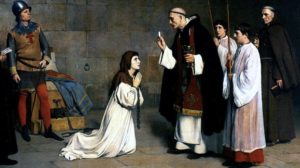
6° articolo: mettendo nelle tue lettere i nomi di Gesù e Maria e il segno della croce che voleva dire di non fare quello che la lettera diceva di fare divieni una traditrice, crudele, assetata di sangue e suscitatrice di tirannia.
7° articolo: avendo lasciato la casa paterna contro il volere di tuo padre ti sei dimostrata empia contro i tuoi genitori e hai disubbidito al comandamento divino che vuole che si onori il padre e la madre.
8° articolo: affermando di aver ricevuto il perdono dopo che ti sei buttata dalla torre di Beaurevoir commetti grave peccato di presunzione.
9°articolo: credendo di non aver mai commesso peccato mortale pecchi di temeraria presunzione e perniciosa menzogna.
10°articolo: l’affermazione che sia Santa Caterina che Santa Margherita parteggiano per i francesi e non per gli inglesi è temeraria e presuntuosa, una superstizione divina e oltraggiosa, una trasgressione al comandamento che dice di amare il nostro prossimo.
11° articolo: affermando di esserti prosternata davanti a Santa Caterina, a Santa Margherita e a San Michele e giurando di non rivelare il segno mostrato al tuo re “a meno che non lo ordini Dio” sei idolatrata, invocatrice di diavoli, eretica e hai pronunciato un illecito giuramento.
12° articolo: dicendo che se la chiesa ti ordinasse di fare il contrario di quello che tu ritieni sia il volere di Dio non le ubbidiresti per nessuna cosa al mondo mostri di avere idee false sull’unità e l’autorità della Chiesa.
Dopo la lettura degli articoli Pierre Maurice, teologo e canonico di Rouen, esorta un’ulteriore volta Giovanna a riflettere riguardo alle sue parole e di pentirsene, dicendo “io ti ammonisco, ti supplico, ti esorto affinché tu ravveda, faccia ammenda dei tuoi errori e ritrovi la via della verità, ubbidendo e sottomettendoti ai giudizi e all’autorità della Chiesa. Se non lo farai e insisterai nei tuoi peccati, sappi che la tua anima sarà dannata e che il tuo corpo, come io temo, finirà distrutto”
Con le parole di Giovanna “se fossi prossima al supplizio e dovessi vedere la catasta innalzata, il fuoco acceso e il boia pronto a gettarmi nel fuoco, se anche fossi già tra le fiamme direi solo quello che ho detto.” termina il suo processo. Ma il giorno successivo, giovedì 24 maggio, alla vista del rogo, Giovanna si tradisce, rinnega la sua forza, caparbietà e determinazione accettando di sottomettersi alla Chiesa militante. La Pulzella viene quindi condannata alla prigione perpetua e le viene imposto di vestire abiti da donna.
Forse però il pentimento per aver tradito la propria fede e i propri angeli porta Giovanna a indossare nuovamente abiti maschili e questo è conferma della presenza del demonio nella ragazza. Giovanna d’Arco è quindi un’eretica, relapsa e scomunicata.
Il 29 maggio la pulzella d’Orléans viene esortata a presentarsi il mattino seguente, il 30 maggio, alle 8 del mattino in piazza del mercato vecchio di Rouen.
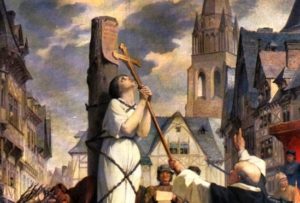 PIERRE CAUCHON:” Ogni qualvolta l’eresia infetta con il suo veleno un membro della Chiesa, trasformandolo in sodale del demonio, conviene impedire, con ardente zelo, che il pernicioso contagio si diffonda alle altre parti del Corpo Mistico di Cristo. Poiché ritornata al male noi ti indichiamo nuovamente colpita dalla scomunica nella quale eri incorsa, relapsa nei tuoi errori ed eretica, dichiariamo che devi essere rigettata dalla Chiesa come un membro marcio, così da non infettare i membri sani, che devi essere recisa dal Suo Corpo Spirituale e abbandonata al braccio secolare.”
PIERRE CAUCHON:” Ogni qualvolta l’eresia infetta con il suo veleno un membro della Chiesa, trasformandolo in sodale del demonio, conviene impedire, con ardente zelo, che il pernicioso contagio si diffonda alle altre parti del Corpo Mistico di Cristo. Poiché ritornata al male noi ti indichiamo nuovamente colpita dalla scomunica nella quale eri incorsa, relapsa nei tuoi errori ed eretica, dichiariamo che devi essere rigettata dalla Chiesa come un membro marcio, così da non infettare i membri sani, che devi essere recisa dal Suo Corpo Spirituale e abbandonata al braccio secolare.”
Né ai giudici, né a Giovanna stessa in realtà sfuggì che questo processo “in materia di fede” fu esclusivamente un processo politico affinché Enrico VI di Lancaster diventasse legittimamente e saldamente erede della corona di Francia oltre che di quella inglese. Era quindi necessario distruggere ciò che Giovanna aveva fatto e in particolare la consacrazione di Carlo VII a Reims per renderlo re di Francia.
BIBLIOGRAFIA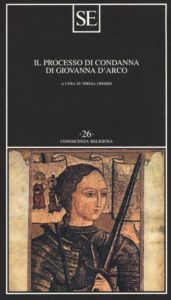
IL PROCESSO DI CONDANNA DI GIOVANNA D’ARCO, a cura di Teresa Cremisi, 220 pagine, Milano, luglio 2ooo, conoscenza religiosa.
FILM CONSIGLIATI
GIOVANNA D’ARCO, 1999, Francia, 152 min, regia di Luc Besson, genere epico, biografico, di guerra e di azione. Suddiviso in tre parti: l’ infanzia della pulzella, la sua vita da guerriera, il processo.
PROCESSO A GIOVANNA D’ARCO, 1962, Francia, 65 min, regia di Robert Bresson, genere storico. Incentrato solamente sulle varie fasi del processo.
THE TRIAL OF JOAN OF ARC
On 21st February 1431 in the chapel of the castle of Rouen in front of the court president Pierre Cauchon, assisted by a large number of aldermen, who are mainly religious figures, sits the famous pucelle d’Orléans: Joan of Arc. The manly dress she used to wear during her mission, the will not to submit to any authority and the pride with which she claimed to hear the Voices of Saint Catherine or of the Archangel Michael constitute the fundamental reasons which the judges used to condemn her heretical.
Pierre Cauchon in the opening order of the process writes that in many places had spread the voice of that forgotten woman of Dignity convenient to her sex, that for a singular and monstrous depravity wore clothes suitable for men and which claimed claims contrary to the Catholic faith. He also writes that when these facts became known to the Fathers of the University and to Brother Billorin, Vicar of the Inquisitor of the Kingdom of France, they begged the Duke of Burgundy to deliver the pucelle to them as she suspected of heresy.
With this accusation, on 21st February 1431, the trial of Joan of Arc began.
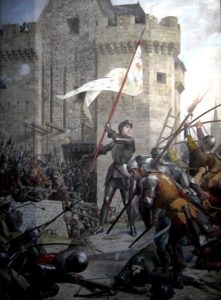 Already during the first public sentence we can see the strong character of the pucelle, which is the source of the strength with which she moved the sword to defend her nation. Proof of this courage and determination is the answer that she gives to Cauchon after being forbidden to leave prison, she says: “I do not accept any prohibition. If I escaped no one could accuse me of having betrayed my word, I promise you absolutely nothing” then she justifies her reply saying: “The prisoners are well entitled to escape:”.
Already during the first public sentence we can see the strong character of the pucelle, which is the source of the strength with which she moved the sword to defend her nation. Proof of this courage and determination is the answer that she gives to Cauchon after being forbidden to leave prison, she says: “I do not accept any prohibition. If I escaped no one could accuse me of having betrayed my word, I promise you absolutely nothing” then she justifies her reply saying: “The prisoners are well entitled to escape:”.
The first sentence is followed by the second in which Joan accurately describes to the presidential court her relationship with the Voices, for which she is condemned heretic.
JOAN:“At the time of my thirteen years I heard a voice sent to me by God to guide my actions. The first time I was very afraid. The voice was heard at noon, we were in summer. In my father’s garden. You know, I was not fasting and had not fasted the night before. I heard a Voice, coming from the right, on the side of the church. Almost always there is also a glow. The light always comes from the same side of the Voice and is usually very loud. I thought it was right that I listen to the Voice. I believe that she was sent by God. After listening to her three times I realized that she was the voice of an Angel. The Voice has always advised me well and I’ve always understood it.
BEAUPERE (assessor): ”What good advice did the Voice give you for the salvation of your soul?”
JOAN: “It told me to behave myself, to go to church. It told me that it was necessary for me, Joan, to come to France. … The voice told me to free Orléans besieged. It told me to visit Robert of Baudricourt in Vaucouleurs to give me men to accompany me.”
JOAN:” No day passes without me hearing the Voices.”
JUDGE:” Do you always see them in the same dress?”
JOAN:” I always see them in the same way. They have their heads surrounded by rich crowns.”
JUDGE:” How do you recognize that the thing that appears to you is man or woman?”
JOAN:” I recognize them from the Voices and revelations that they make me.”
JUDGE:” What kind of figure appears to you?”
JOAN:” The face.”
JUDGE:” Is the hair long to the shoulders?”
JOAN:” I don’t know anything about it. I don’t know if there are also arms or other members. They speak very well with kindness and I understand them.”
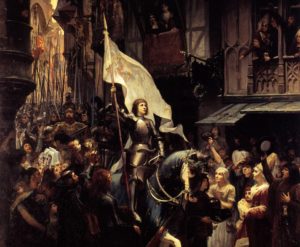 The Voices are also the main subject of the two subsequent interrogations in which Joan claims that they tell her what to answer to the questions asked, and that they give her comfort. As she says:” much comfort came to me also from Saint Michael, he was the first to show himself to my eyes.” And was the Voices who suggested that she would find her sword in the church of Sainte Catherine of fierbois, and assure her that the siege of Orléans would end with French victory. The Voices constitute for Joan the reason for all her actions, in fact often during the process repeats the phrase”all that I did I did by God’s will.”
The Voices are also the main subject of the two subsequent interrogations in which Joan claims that they tell her what to answer to the questions asked, and that they give her comfort. As she says:” much comfort came to me also from Saint Michael, he was the first to show himself to my eyes.” And was the Voices who suggested that she would find her sword in the church of Sainte Catherine of fierbois, and assure her that the siege of Orléans would end with French victory. The Voices constitute for Joan the reason for all her actions, in fact often during the process repeats the phrase”all that I did I did by God’s will.”
In the last public hearing on Saturday 3 March, the judge initially examines the reasons why Joan wears men’s clothes.
JUDGE:” Have you ever been asked about this clothing?”
JOAN:” Yes, they asked me where and when I had begun to wear men’s clothes; I answered that it had been to Vaucouleurs.”
JUDGE:”At Beaurevoir Castle they didn’t ask you about this clothing?”
JOAN:” Yes, yes. And I answered that I would not change clothes without God’s permission. Madame of Luxembourg and the Lady of Beaurevoir had offered me a woman’s dress or cloth to make me one and asked me to wear it but I said that I had not received the authorization of Our Lord.”
JUDGE:”Did you think you were committing mortal sin by wearing women’s clothes?”
JOAN:” I believe I do better trying to obey and serve my Lord.”
Finally, the last of the public hearings concludes with the questions of the judge concerning the honours that the pucelle received entering the villages and about the attacks she made against the English cities. To these questions Joan answers with the usual zeal and insolence avoiding the details and highlighting the will of the divine figure that constituted the reason for her every gesture, repeatedly several times that she would have preferred to give his soul to God rather than to be in the hands of the British.
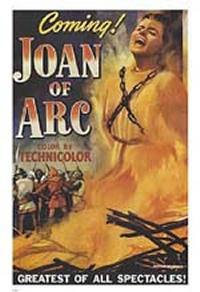 But it is only in the sixth supplementary interrogation which took place on 17th March in Joan’s prison, when the judge becomes aware of the pucelle’s will not to uphold the laws of the Church, as Cauchon wrote in the opening order. Joan refuses to submit to the militant church“constituted by the pope and all other men of faith” but believes only in the triumphant one.
But it is only in the sixth supplementary interrogation which took place on 17th March in Joan’s prison, when the judge becomes aware of the pucelle’s will not to uphold the laws of the Church, as Cauchon wrote in the opening order. Joan refuses to submit to the militant church“constituted by the pope and all other men of faith” but believes only in the triumphant one.
JUDGE:”So you want to give yourself back to the militant Church?”
JOAN:” I was sent by the King of France by the will and commandment of God, of the Virgin Mary, of all the blessed saints of Paradise, by the victorious Church up there! To this Church I answer for all my actions done or to be done, as to submit to the militant Church, I have nothing else to say for the moment:”
Finally, on 27th and 28th March the 70 articles that make up Joan of Arc’s indictment are read and she refuses to repent. Subsequently the 70 articles are then summarized in 12 that are read on May 13th to Joan, with the hope that the pucelle can finally repent and agree to submit to the militant Church.
1° article: The revelations and apparitions you claim to hear and see come from evil and evil spirits.
2° article: The affirmation of the divine sign that the King of France received from an Angel constitutes an invented story, offensive to the dignity of the Church and the angels.
3°article: Claiming to believe in the apparitions as you believe in God you sin against the faith.
4°article: to predict some facts, to recognize people never seen before means to use superstition, divination and presumption.
5° article: By wearing men’s clothes and receiving the Eucharist in these clothes you blaspheme against God and insult him, you transgress divine law, sacred scriptures and canonical norms.
6° article: putting in your letters the names of Jesus and Mary and the sign of the cross that meant not to do what the letter said to do, you become a traitor, cruel, bloodthirsty and arousing tyranny.
7° article: having left your father’s house against the will of him, you have shown yourself to be wicked against your parents, and have disobeyed the divine commandment that the father and mother should be honoured.
8°article: claiming to have received forgiveness after you threw yourself from the tower of Beaurevoir you commit a grave sin of presumption.
9°article: believing to have never committed mortal sin you lack of reckless presumption and pernicious lie.
10°article: The affirmation that both Saint Catherine and Saint Margaret side with the French and not with the English is reckless and presumptuous, a divine and outrageous superstition, a transgression to the commandment that says to love the others.
11° article: claiming to have bowed down before Saint Catherine, Saint Margaret and Saint Michael and swearing not to reveal the sign shown to your king“unless God commands it” you are idolized, invoker of devils, heretics and you took an unlawful oath.
12° article: saying that if the church ordered you to do the opposite of what you believe to be God’s will you would not obey them for anything in the world you show to have false ideas about the unity and authority of the Church.
After reading the articles Pierre Maurice, theologian and canon of Rouen, exhorts a further time Joan to reflect on her words and to repent, saying “I admonish you, I implore you, I urge you to repent, to atone for your mistakes and to find the way of truth, obeying and submitting to the judgments and authority of the Church If you do not and persist in your sins, you must know that your soul will be damned and that your body, as I fear, will be destroyed”.
With the words of Joan “if I were close to the torture and I had to see the pile raised, the fire lit and the executioner ready to throw me into the fire, even if I were already in the flames I would say only what I said.” ends his trial. But the next day, Thursday 24th May, at the sight of the stake, Joan betrays herself, denies her strength, stubbornness and determination by agreeing to submit to the militant Church. The pucelle is then sentenced to perpetual imprisonment and ordered to wear women’s clothes.
Perhaps the repentance for betraying her faith and her own angels leads Joan to wear male clothes again and this is the confirmation of the presence of the devil in her. Joan of Arc is therefore a heretic, relapsa and excommunicated.
On 29th May , the pucelle of Orléans is urged to appear the following morning, May 30, at 8 o’clock in the morning in Rouen’s old market square.
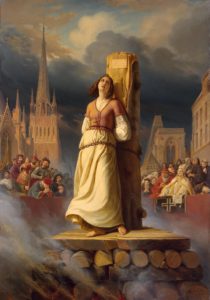 PIERRE CAUCHON:” Whenever heresy infects a member of the Church with its poison, turning him into a companion of the devil, it is advisable to prevent, with ardent zeal, the pernicious contagion from spreading to the other parts of the Mystical Body of Christ. Having returned to evil, we point out once again to you as struck by the excommunication in which you were incurred, related to your errors and heretical, we declare that you must be rejected by the Church as a rotten member, so as not to infect the healthy members, that you must be severed by His Spiritual Body and abandoned to the secular arm.”
PIERRE CAUCHON:” Whenever heresy infects a member of the Church with its poison, turning him into a companion of the devil, it is advisable to prevent, with ardent zeal, the pernicious contagion from spreading to the other parts of the Mystical Body of Christ. Having returned to evil, we point out once again to you as struck by the excommunication in which you were incurred, related to your errors and heretical, we declare that you must be rejected by the Church as a rotten member, so as not to infect the healthy members, that you must be severed by His Spiritual Body and abandoned to the secular arm.”
Neither the judges nor Joan was unaware that this trial was being held “in matters of faith” It was exclusively a political process for Henry VI of Lancaster to become legitimately and firmly heir to the crown of France as well as to the English crown. It was therefore necessary to destroy what Joan had done and in particular the consecration of Charles VII to Reims to make him king of France.
BIBLIOGRAPHY 
THE TRIAL OF JOAN OF ARC, by Teresa Cremisi, 200 pages, Milan, july 2000, conoscenza religiosa.
FILMS RECOMMENDED
JOAN OF ARC, 1999, France, 152 min, directed by Luc Besson, genres: epic, biography, war, action. It is divided into three parts: the childhood of the pucelle, her life as a warrior, the trial.
THE TRIAL OF JOAN OF ARC,1962, France, 65 min, directed by Robert Bresson, genre: historical. It is focused only on the trial of Joan.
ARTICOLO DI ASIA TROTTO DELLA CLASSE III B DEL LICEO CLASSICO

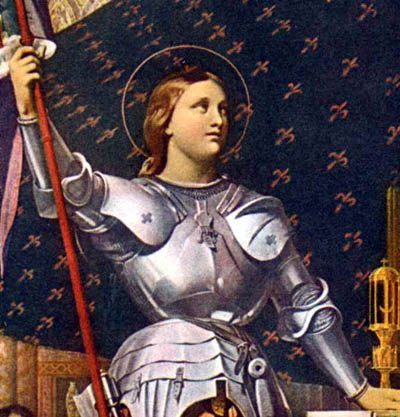
Commenti recenti